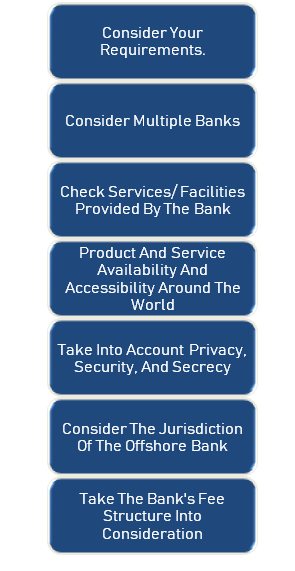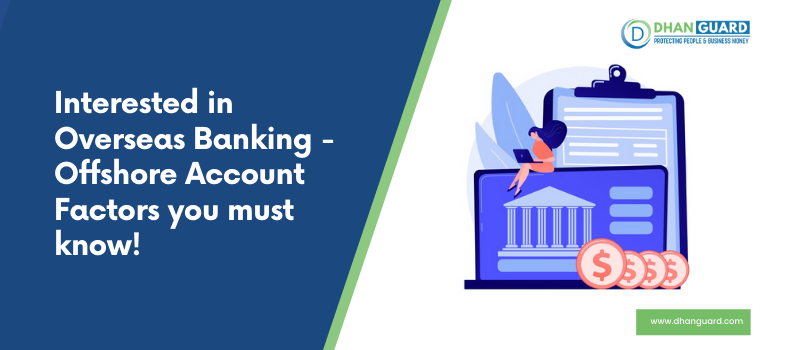Offshore bank Accounts are those that are based in a country other than the account holder's home country. Furthermore, offshore banks are required to be regulated by their respective jurisdictional authorities in order to provide offshore banking services. In comparison to retail bank accounts, offshore banks are known for providing a wide range of incentives to account holders. This has made them popular among high net worth people as well as foreign enterprises. In this blog we will have a look at seven key considerations to make before opening an Offshore Bank Account
Factors to consider before opening an Offshore Bank Account

CONSIDER YOUR REQUIREMENTS
You should think about your needs as objectively as possible before deciding on an offshore jurisdiction and an offshore bank.
- Do you need to send money internationally or maintain accounts in many currencies?
- Do you live in a country other than your own?
- Do you travel between nations on a frequent basis?
- Are you seeking for a secure place to put your money?
- Are you considering relocating to another country to retire?
Consider not only your current requirements, but also your potential future ones. Furthermore, compared to retail bank accounts, offshore bank accounts typically have substantially higher minimum deposit/assets under management requirements. Before you open an offshore bank account, keep the aforementioned in mind.
CONSIDER MULTIPLE BANKS
Examine the numerous banks in your chosen jurisdiction that provide offshore services. You may prefer a company whose name you recognize, or you may be looking for a bank that provides the precise features and perks you require. Whatever bank you choose, it must have experience with overseas clientele and place a high value on them.
Banks that primarily conduct local business may lack the skills needed to navigate today's increasingly complicated regulatory environment for international banking. Service levels, banking and support channels, and customer service languages are all key considerations before selecting a bank.
CHECK SERVICES/ FACILITIES PROVIDED BY THE BANK
Your offshore bank should be able to provide you with a choice of products and services to assist you manage your international holdings effectively and efficiently, reduce your tax liabilities, and secure your assets from creditors, estranged spouses, and other family members. It should also assure continuing ownership of enterprises without fragmentation amongst numerous owners by transferring assets in an orderly, controlled, and structured manner to younger generations of your family.
PRODUCT AND SERVICE AVAILABILITY AND ACCESSIBILITY AROUND THE WORLD
Using the sample questions below, determine the global availability and accessibility of your offshore bank's products and services:
- Depending on your country's legislation, do you have access to global markets and a global range of products and services?
- Is the validity and acceptance of your bank's goods (debit cards, credit cards, etc.) global?
- Do you have access to global product and customer support?
- What if you could have “anytime” transactional access to your bank account from any location on the planet?
TAKE INTO ACCOUNT PRIVACY, SECURITY AND SECRECY
Customers have more options thanks to the expansion of digital banking channels such as the Internet and mobile banking. The ease of being able to use it at any time and from any location. While you should adopt excellent security behaviors, you should also make sure that your offshore bank provides security features such as;
- Multiple security layers, including the usage of login usernames and passwords, security devices, and instantaneously created pass codes sent through SMS or email, among others.
- All financial and key non-financial transactions will be subjected to extra security levels.
- Instant alerts through SMS/email when a wide range of financial and non-financial transactions are completed.
- In addition, an offshore bank should provide you with higher levels of data confidentiality and customer privacy than a traditional retail bank.
CONSIDER THE JURISDICTION OF OFFSHORE BANK
Your offshore banking jurisdiction should meet the following requirements:
- Political, economic, and regulatory stability, as well as steady tax and inheritance structures.
- A well-established network of private bankers, wealth managers, legal and financial professionals, and service providers with experience catering to the demands of high-net-worth individuals (including international needs).
- Direct and indirect tax rates are zero or low (whether on income, capital gains, assets, transactions, consumption or otherwise).
- The existence or lack of double taxation agreements (DTA) or tax information sharing agreements between the jurisdiction you are considering and other nations, particularly your home country, may have an impact on your decision. You may wish to take advantage of these deals or stay away from them.
- In essence, you're seeking for a jurisdiction with a long history of political/economic stability and offshore banking services. Singapore, Switzerland, the Isle of Man, and other popular places are just a few examples.
TAKE THE BANK’S FEE STRUCTURE INTO CONSIDERATION
Your offshore bank may charge you a flat fee, which could be a proportion of your entire assets under management, such as 1%. All transactional, custody, and advising costs are covered by this charge.
Alternatively, separate price structures for different products may exist; under this paradigm, the greatest costs may be charged for advising, discretionary management services, and managed funds. Take the time to thoroughly grasp your bank's cost structure, including checking over all bank paperwork. Also, ask your relationship manager to clarify the fees that apply to your situation in detail.
Conclusion
Thus we can conclude with the fact that it's important to remember that not all offshore accounts in different countries operate in the same way. That's why you should think carefully before opening your first account. Also taking the above points into consideration before opening one, can be a good decision, as advised by our experts. We hope this blog provided you with incite full information. For information on other related aspects, feel free to check out our website.

